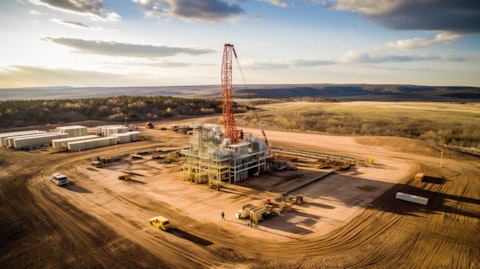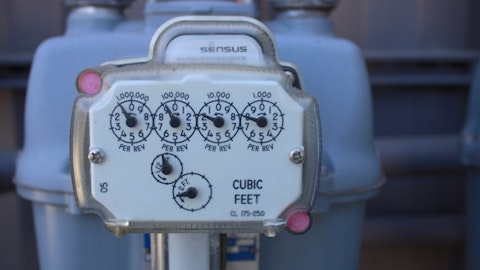USA Compression Partners, LP (NYSE:USAC) Q3 2023 Earnings Call Transcript October 31, 2023
USA Compression Partners, LP beats earnings expectations. Reported EPS is $0.2085, expectations were $0.11.
Operator: Good morning. Welcome to USA Compression Partners Third Quarter 2023 Earnings Conference Call. During today’s call, all parties will be in a listen-only mode. At the conclusion of management’s prepared remarks, the call will be opened for Q&A. [Operator Instructions] This conference is being recorded today, October 31, 2023. I would now like to turn the call over to Chris Porter, Vice President, General Counsel and Secretary.
Chris Porter: Good morning, everyone, and thank you for joining us. This morning, we released our operational and financial results for the quarter ending September 30, 2023. You can find a copy of our earnings release as well as a recording of this call in the Investor Relations section of our website at usacompression.com. During this call, our management will reference certain non-GAAP measures. You will find definitions and reconciliations of these non-GAAP measures to the most comparable U.S. GAAP measures in our earnings release. As a reminder, our conference call will include forward-looking statements. These statements are based on management’s current beliefs and include projections and expectations regarding our future performance and other forward-looking matters.

Aerial view of an oil and natural gas drilling operation on a leasehold position.
Actual results may differ materially from these statements. Please review the risk factors included in this morning’s earnings release and in our other public filings. Please note that information provided on this call speaks only to management views as of today, October 31, 2023, and may no longer be accurate at the time of a replay. I’ll now turn the call over to Eric Long, President and CEO of USA Compression.
Eric Long: Thank you, Chris. Good morning, everyone, and thanks for joining our call. I am joined on the call today by Eric Scheller, our COO. This morning, we released our third quarter 2023 results, which highlight the continued improvement in our financial and operational results, as we continue to focus on capital discipline and maximizing return on our assets. Eric Scheller will provide more detail on our results, but I would like to highlight our third quarter distribution coverage, which grew to 1.39 times continuing our trend of increasing distribution coverage is here. In addition, our leverage ratio was 4.21 times continuing progress towards our previously mentioned goal of 4.0 times, a welcome improvement in both metrics.
Methodical de-levering of our balance sheet over the coming quarters positions us well for when our senior notes mature, which is not until Q2 2026 and Q3 2027. Our unit price this past year has trended up from the $18 range to recently over $26 levels last seen in 2014. We attribute this to the recent addition of compression as a qualifying activity in the VettaFi Alerian MLP Infrastructure Index, AMZI, as well as what we believe is a show of confidence by investors in the historical stability and sustainability of USA Compression’s revenues, EBITDA, DCF, and distributions. Long-term investors have seen that since we became a public company over 10 years ago in 2013, we have provided stability and growth across numerous energy, macroeconomic, and interest rate cycles and have never reduced our quarterly distribution.
In fact, we have proactively returned over $1.6 billion to our unitholders through distributions reflecting a history of capital discipline that returns value to unitholders that extends well before that concept became a core focus for our industry by the investment community. Switching gears, I would like to reaffirm some of the drivers supporting our business. As we have mentioned in the past, we believe the macro environment in our industry remains supportive for the continued improvement of our financial and operational results. The IEA and OPEC are both forecasting a very tight global crude oil market for the remainder of the year and into 2024. OPEC recently updated its global outlook projecting continued increase in oil demand through the end of its forecast period in 2045 as rising energy demand in emerging markets offsets any demand declines in the developed world.
In addition to the continued need for crude oil, U.S. natural gas exports are expected to reach record levels in 2023 and continue to grow in 2024, especially as major new LNG facilities are scheduled to come on stream in the U.S. over the next few years. These factors combined with the capital discipline seen throughout the industry, we believe provides a solid and sustainable base for the demand of our compression services. As we reflect more on the natural gas compression industry in particular, we continue to believe there will be an industry-wide shortage of large horsepower compression units of the type that make up the bulk of our fleet horsepower. We believe this shortage will persist for the foreseeable future as recent inflation has caused new equipment costs to reach levels that make new unit purchases economically less attractive for natural gas compression service providers.
As a result, we are experiencing a continued tightening in the compression market. Our customers and others in the industry have just begun to digest and wrap their heads around this continued tightening and inevitable substantial increases in monthly service fees required to justify the construction of new equipment due to the large increases in new equipment costs. We believe continued equipment shortages will provide us the ability to both high grade our customer base to larger customers who understand and value the exemplary levels of compression services provided by USA Compression, as well as the opportunity to capture expanded economic margins and maintain our high fleet utilization rates. We envision continued improvements to our balance sheet and financial condition consistent with what was shown by our most recent results.
As an example, continued development of demand-driven pricing for our services, increased average revenue per horsepower per month to $19.10 during the third quarter, while we also successfully increased our exit rate fleet utilization to 94%. As we have mentioned in the past, we have always endeavored to modify our capital investment strategy to maximize the value of USA Compression in response to then current market dynamics. Given the current tightening and the natural gas compression space, the substantially higher cost of new compression units requiring dramatically higher monthly service fees to maintain our historical margins and the current geopolitical uncertainty. We believe the best way to maximize stakeholder value in the current market is to direct capital in 2024, primarily to the conversion of vital units to active status and limiting the acquisition of new organic growth compression units.
Recall that we have about a 100,000 horsepower being delivered during Q4 2023 and into the first half of 2024. Acquisition costs for these units were locked in at the time of order back in late 2022 and at capital costs substantially below those now being quoted by our equipment manufacturers and fabricators for 2025 deliveries. As our customers and others in the industry digest the higher contract pricing that is required to justify the substantial increase in the cost of new compression units, while maintaining our historical margins, we will continue our focus on demand driven pricing for the compression services we provide across our existing active fleet. As price discovery in the coming quarters for new units continues and reaches levels that support new compression unit costs, we will then of course reevaluate our capital investment strategy, as we have always done.
Before turning the call over to Eric Scheller to discuss third quarter operating and financial results, I would like to express my unwavering support to all of our employees for embracing and living our culture of safety here at USA Compression. The safety of our employees, contractors and customers is absolutely the most important thing we do as a company. I am pleased that our safety performance is outperforming the industry average and that our employees continue to focus on being safe in all we do each and every day. We are extremely proud of our employees and thank every USA Compression employee for their continued commitment to our safety policies and procedures. With that, I will turn the call over to Eric Scheller, our COO to discuss our third quarter highlights.
Eric Scheller: Thanks, Eric, and good morning all. As Eric noted, the strong results we reported this morning once again reflect our employees continued commitment to creating value for USA Compression and its stakeholders. In addition to our increased utilization and pricing Eric mentioned, we also continued to capture extended contract tenors for both new unit contract activity and renewal contracts for existing fleet assets. Given the durability, these extended contract tenors provide and the continued market tightness, we believe the underlying fundamentals of our business will remain supported for the foreseeable future. Our third quarter 2023 results revealed the 5% increase in sequential quarter revenues and a 21% increase in revenues compared to the year ago period.
While revenue growth was driven by continued utilization and pricing improvements, margins remained relatively steady on a sequential quarter basis as we continue to offset our increased inflationary costs through both productivity improvements and contractual inflation and CPI passed through adjustments. Although we continue to experience inflation in parts, supplies and labor, we believe the continued demand driven pricing discovery occurring for our services along with the CPI-U rate adjustments provided for in the bulk of our customer contracts will continue to support adjusted gross margins in line with our historical averages closer to 67%. Third quarter 2023 net income was $20.9 million. Operating income was $61 million. Net cash provided by operating activities was $50.1 million.
And cash interest expense net was $41.4 million. Cash interest expense increased by approximately $1.2 million on a sequential quarter basis due to higher average outstanding borrowings and higher interest rates applicable to outstanding borrowings on our floating rate credit facility. However, this increase was more than offset by $2.5 million of cash payments received under our $700 million notional principal fixed rate interest rate swap. Turning to operational results, our total fleet horsepower at the end of the quarter remained essentially flat for the previous quarter at approximately 3.7 million horsepower. Our revenue generating horsepower increased by 1% on a sequential quarter basis due to a combination of converting idle units to active status, as well as the addition of new large horsepower units.
Third quarter 2023 expansion capital expenditures were $62.5 million, and our maintenance capital expenditures were $7.2 million. Expansion capital spending continues to consist of reconfiguration and make-ready of idle units, along with accepting delivery of 20,000 horsepower of new large horsepower units during the quarter. We currently expect to take delivery of an additional 62,500 horsepower of new large horsepower units during the fourth quarter, plus additional and ongoing conversion of current fleet idle units to active status. During the first half of 2024, we expect to take delivery of 37,500 horsepower, which is the remainder of our late 2022 order. Additionally, throughout 2024, we anticipate the conversion from idle to active status of about a 100,000 horsepower of existing fleet assets at capital costs substantially below those of new organic growth equipment bills.
Finally, I am pleased to share that on November 3, we will make our 43 consecutive quarterly distribution payment. The $0.525 per unit distribution is flat to the previous quarter’s distribution. And with that, I will turn the call back to Eric Long for concluding remarks.
Eric Long: Thank you, Eric. Our third quarter reflects our employee’s ability to continue to deliver meaningful value to our stakeholders. Given the continued tightness in crude oil markets, the increasing use of natural gas globally, and the shrinking supply of available large horsepower natural gas compression domestically. We firmly believe that USA Compression is well positioned to improve our financial metrics in the future. Continue the improvements to our active fleet size, utilization, contract tenors and contract pricing will increase our financial optionality for further capital investment, leverage reductions and distribution policy changes. To conclude, we are extremely pleased with our third quarter results highlighted again by record quarterly revenues, adjusted EBITDA, distributable cash flow, and distribution coverage in which also featured continued improvements to utilization and contract pricing.
We expect to file our Form 10-Q with the SEC as early as this afternoon. And with that, we will open the call to questions.
Operator: [Operator Instructions] Our first question comes from Selman Akyol from Stifel. Please go ahead. Your line is open.
See also 30 Most Profitable Agricultural Business Ideas for Young Entrepreneurs and 25 Least Racist States in the US.
Q&A Session
Follow Us Alliance Corp (NYSE:USAC)
Follow Us Alliance Corp (NYSE:USAC)
Receive real-time insider trading and news alerts
Selman Akyol: Thank you. Good morning. I guess first of all, can you just talk about lead times for new equipment? Is it still about a year out or is it getting longer?
Eric Long: Selman, this is Eric. Really good question. In light of the market environment we’re living in, things have actually lengthened on the delivery of major components from our largest manufacturer Caterpillar. They’ve got a pretty nice order book, but they continue to have rolling supply chain issues. And it’s not any one thing as multiple things that are occurring. So we’re substantially in excess of a year for orders that would be placed today.
Selman Akyol: Got it. And then in terms of just when you’re speaking with your customers, are you seeing any changes in the tenor of contracting or are you being able to do longer than three to five years, or is it still sort of in that period?
Eric Long: Yes. So I’m going to get that two ways. The first thing would be kind of the original primary term. We’re routinely seeing five-year contracts. We really don’t go much beyond five. We have a few instances throughout the history of the company where we’d see some things longer than that. At the end of the primary term when things do revert to a 30-day, month-to-month, either party can terminate evergreen. The only thing that changes literally would be the ability to terminate a contract. It’s those renegotiated reextended tenors that we’re seeing clients are signing up these renewal contracts sooner than normal. They’re extending the term for longer than normal. Historically, a five-year primary term contract, you might see folks going with a one or two or two or three year contract extension.
We’re now routinely seeing kind of two to five years, so the tenor is getting longer. All of our contracts have CPI escalators on the things we enter into today. The vast majority of even our older MSAs provide for CPI escalators. So if you think about it, we have a natural inflation hedge. You look at new builds versus repricing of our existing book. We will have substantially more uplift on repricing the existing asset book over the coming years than we will from the incremental organic growth CapEx, even if it was mash the accelerator and go back to the go-go days deploy excessive amounts of growth CapEx. So what really is going to move our dial going forward is to continue to reprice our book. We have significantly extended our tenor.
We have reduced the number of month-to-month contracts by terming up with these five-year type terms. And I think we’re setting ourselves very well up for a very durable and sustainable focus over the coming years on from the bottom left of the page to the top of the right of the page on revenue growth.
Selman Akyol: Yes. It sounds like a really strong outlook. Can you maybe just talk about the price increases you’re seeing in, I guess I’m thinking in terms of maybe spot two, where your book is or maybe what you ended up contracting over the last quarter or two?
Eric Scheller: Selman, this is Scheller. The book has been really strong growing up, pretty stout rate since we started to see the return to the market all the way back in 2022. The tightness that Eric just talked about and as people are trying to figure out how to manage the greater than 12-month deliveries is bringing people to the table at a very regular rate. People aren’t letting stuff get to the end of the term. People are coming to our regional Vice Presidents early to discuss their position. So we continue to see the growth in the existing revenue for renewals as well as for the new units that are coming on now and into the first quarter of 2022.
Selman Akyol: Got it.
Eric Long: And Selman, it’s Eric. One other comment on that too. We mentioned in our comments that we’re seeing rate increase. We’re seeing CapEx cost increase, substantial CapEx cost increase, and we’re not about growth for the sake of growth. We’ve had some competitors in the past who were private, didn’t live in the public world scrutiny and they were willing to take a dive on gross margins and utilization and other things. And we looked at it and said, our job is to maintain return on capital that we invest and capital we deploy. So we look at the contracts we entered into to source new equipment two, three years ago, what those things were deployed at. We look at maintaining those margins and looking then at 2025, 2026, when equipment costs go up 30% or 40%, you’ve got to have a commensurate increase in your monthly service fees.
So my comment of, hey, we’ve got our customers are trying to wrap their head around just what this means. Our assets are must run assets. People can’t drill, can’t produce natural gas, oil production, et cetera, without compression. So when they’re looking at $80 oil, $90 oil, whatever it is in excess of $30 or $40 a barrel, it’s highly profitable. And you’re starting to see some pushup in natural gas prices. You’re starting to see some LNG facilities that’ll be coming on screen [ph] in the next 18, 24, 36 months. Exactly at a point in time where there’s not a lot of available equipment and cost of the equipment are going up. So that’s why we look at it. We’ve always been a story of stability and growth. Right now it’s a time for us to focus on stability.
There’s a lot of uncertainty in turmoil in the world, increasing interest rates. Let’s control the things that we can control. And to the extent, we’ve got key customers who recognize the value proposition, understand the value of what we bring to the table and what’s going to be required with the increase in capital cost and labor cost and inflationary pressures, then we’ll go ahead and methodically commit to build some incremental equipment on their behalf. To the extent that the value proposition isn’t recognized or people say, whoa, the cost of the new car is awfully expensive here. What can I do as an alternative? Then we will slow that growth and we’ll continue to focus on pushing our existing asset valuations up, push the monthly service fees up as these things roll off of primary term and get re-priced in excess of CPI escalators.



